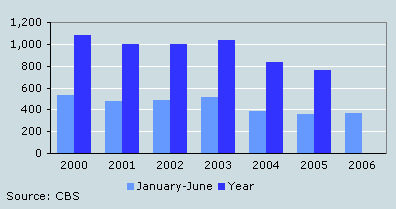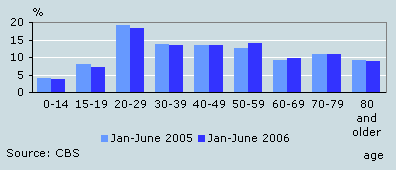No further reduction in traffic deaths

In the first six months of this year, 363 persons died on Dutch roads. The road death toll in the first six months of 2005 stood at 359.
Number of traffic deaths

Daily death toll reduced from nine to two persons
After a sharp increase in the 1950s and 60s, the traffic death toll peaked in 1972, when over 3 thousand persons were killed. On average, nearly 9 persons died every day on Dutch roads in that year. After 1972, a downward trend started, resulting in an average daily death toll of two persons in the first half of 2006.
Number of traffic deaths by age

Slight decrease among young road victims
Comparatively, fewer young people under the age of 30 were killed. The share of this group in the total number of traffic deaths decreased in the first half of 2006 compared to the same period last year. The favourable trend among young people can be observed since 2004. The share of victims in their fifties and sixties, on the other hand, has risen.
Number of traffic deaths by age and gender, Jan-June 2006

Mainly young motorists
Nearly half of all road fatalities were car passengers. Twenty percent were cyclists, 12 percent were pedestrians and 9 percent motorcyclists. Seven in every ten persons killed on Dutch roads were men. Most of the 260 male road victims were in the 20-30 age category; 75 percent of them were car passengers.
A relatively high death toll was also reported in the 30-60 age bracket. Half of them were car passengers. Three in every ten male traffic deaths aged between 30 and 40 were motorcyclists. The number of female traffic deaths was fairly evenly spread across the various age groups.
No clear trend as yet
For the second year running, the number of traffic fatalities fell dramatically in 2005 compared to the previous year. The decrease mainly affected men and children. In the first half of 2006, this trend was interrupted. As yet it is uncertain what the total traffic death toll over 2006 will be. Meteorological conditions in the latter half of 2006, for instance, play a crucial role in this respect.
Jan Hoogenboezem